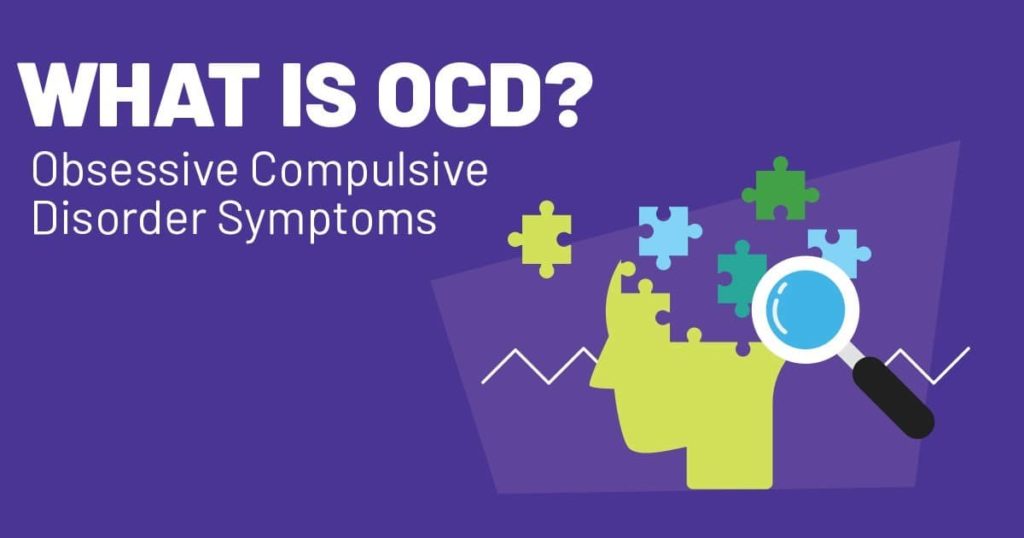What is OCD? Obsessive-compulsive disorder or OCD can affect anyone regardless of age or background. When you have OCD, you may struggle with obsessions and compulsions, which are repetitive behaviors.
Obsessions are unwanted and intrusive thoughts or urges. These unwanted thoughts and urges create extreme distress. Compulsions are behaviors you might engage in to avoid obsessions or experience less related stress.
Everyone has obsessive thoughts and perhaps compulsive behavior at some point or another in their daily life, but that doesn’t mean they have OCD. OCD is a mental health disorder with formalized diagnostic criteria.
For an OCD diagnosis, you would experience obsessions and compulsions at such an extreme level that it would consume much of your time and impact your quality of life and daily activities.
Do I Have OCD?
If you’ve ever asked yourself, “do I have OCD,” or “was I born with OCD?” you aren’t alone.
If you’re concerned that you could have obsessive-compulsive disorder symptoms, first, it helps to know what obsessions are and more about diagnostic criteria for this mental disorder.
- Obsessions are thoughts, impulses, or images that repeatedly occur. You feel like they’re out of your control, and they’re disturbing to you. If someone does have OCD, they usually realize the thoughts are irrational or illogical, but they feel like they can’t stop them.
- Obsessions usually come with uncomfortable emotions like doubt, disgust, or fear. Sometimes, when they’re dealing with obsessions, people are overwhelmed with the feeling that something has to be just right.
- When people have OCD, their obsessions take up a lot of time and interfere with other things they want or need to do in life.
The thoughts that a person with this mental health condition might be the same as what other people have from time to time. For example, you might occasionally worry about someone’s safety when you love them. However, with OCD, the thoughts aren’t fleeting. They’re intrusive to the point that, again, they cause significant disruptions in everyday life.
Obsessive fears that are somewhat common as part of obsessive-compulsive symptoms include:
- Contamination such as through environmental contaminants, germs or disease or bodily fluids
- Unwanted sexual thoughts
- Fear of being responsible for something tragic or horrible happening
- Fear of hurting others because you aren’t being careful enough
- Obsessions about your sexual orientation
- Concern about getting an illness or disease
- Concern about things being even or exact
- A concern with needing to remember something
- Fear of losing things
What Are Compulsions?
Compulsions are the second part of OCD.
Compulsions are behaviors or thoughts that you might repetitively do in an attempt to get rid of your obsessions or somehow counteract them. When you have OCD, you usually realize it’s only a temporary coping mechanism, but you continue to do it.
Compulsions take up a lot of time, and they’re a priority over other things in your life.
Compulsions commonly seen in OCD include:
- Excessive showering or grooming
- Cleaning household items or objects excessively
- Doing things to try to eliminate contact with chemicals
- Checking you didn’t harm yourself or others
- Repeatedly checking to ensure you didn’t make a mistake
- Putting things in order or arranging them until you feel like they’re right
- Mental reviews of events
- Praying to prevent harm to yourself or others
- Trying to undo which might mean that you try and replace what you see as a bad word with a good word as a way of “canceling” it out
- Rereading or rewriting things
- Repeating certain activities or body movements
- Repeating activities in multiples, meaning a certain number of times because that’s what feels right to you
Are There Different Types of OCD?
Sometimes obsessions and compulsions can be characterized into different groups, which is the primary way we think about different types of OCD. These groups can include:
- Organization: This type of OCD is probably the most recognizable for many people. Someone with an obsession subcategory of OCD might feel like things must be perfectly symmetrical or precisely right. If you’re someone with organization-type OCD, you might feel like you’ll feel emotional distress if you don’t perform the compulsions you have to make things exactly right. You might also think that if items are disorganized, they will cause harm to your loved ones.
- Fear of contamination: If you have contamination OCD, it means that you might be afraid of the spread of non-viral illnesses or have an obsessive fear of germs. You could also be worried that things around you, words, or thoughts could contaminate you or make you feel unclean. With contamination OCD, common obsessions can include feeling like you need to clean your hands often or clean items to avoid spreading what you perceive to be contamination. Your fear of contracting germs may dominate much of your life. You might spend significant amounts of time on compulsive rituals.
- Intrusive thoughts: If you have intrusive thoughts, these are out of control, and they pop in your head, seemingly randomly. These could include sexual obsessions or another type of obsession. You may feel like to get rid of the thoughts; you have to act.
- Rumination: Like intrusive thoughts, with rumination OCD symptoms, the ideas you might get stuck on aren’t necessarily distressing. They might instead be questions about the world or religion, for example, that you can’t get an answer to.
- Checking: If you have the checking subtype of OCD, you could be worried your carelessness will harm others or lead to damage. You repeatedly check things to try and make yourself feel at ease or engage in mental rituals.
- Hoarding: When you’re worried about throwing things away to the point that it causes you to hold onto items you shouldn’t, it can be a type of OCD. Hoarders may feel like they need a certain number of things to protect themselves from harm, or they could have an extreme fear of throwing something away that’s important. Hoarding is a subtype of OCD that is different from hoarding disorder. The critical difference is that OCD-related hoarding is distressing to the person experiencing it.
The subtypes of OCD above aren’t necessarily different types of this disorder, but there are distinctions based on how it affects you.
OCD Triggers
While every person will experience OCD somewhat differently, the cycle can look the same after triggered. The trigger for OCD is a thought, image, or urge that distresses you. Then, once that obsession begins, which is the trigger, you feel anxiety. Anxiety creates the desire to act on compulsions to try and provide yourself relief.
Triggers can be something in your mind or the environment leading you to have a particular thought, mental image, or feeling or take action.
A trigger can increase your symptoms.
Stress can be a general trigger for many people with OCD. When you’re already experiencing an external stressor, it can bring your attention to an obsession.
Obsessive-Compulsive Disorder Treatment
There are effective obsessive-compulsive disorder treatment options available.
OCD therapy often centers on cognitive-behavioral approaches and psychological therapy. Cognitive-behavioral therapy may use a combination of exposure and response prevention (ERP) and cognitive therapy. ERP has the most substantial scientific evidence indicating it’s among the effective treatments for OCD.
Combined treatment with medications may also be used, such as antidepressants to balance brain chemicals. Many of the same medicines used for anxiety disorders are part of a treatment plan for OCD. Working with a licensed counselor or experienced mental healthcare provider is essential.
If you’d like to learn in more detail about a treatment program for OCD for yourself or your loved one, please call (858) 258-9883 to get in touch with one of the experts at The Mental Health Center of San Diego.















